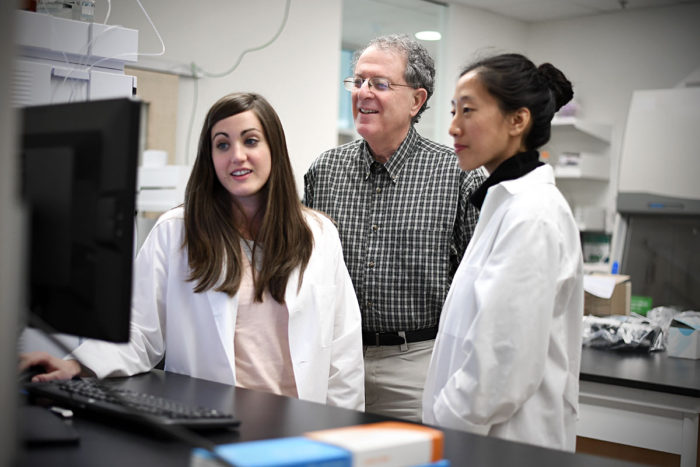Gordon receives 2017 Horwitz Prize
‘Father of microbiome’ honored for revealing importance of gut microbes in human health, disease
 James Byard
James ByardJeffrey Gordon, MD, (center) has received the 2017 Louisa Gross Horwitz Prize from Columbia University. Gordon is being honored for his leading role in founding and expanding the field of human microbiome research. Carrie A. Cowardin, PhD, (left) and Vanderlene L. Kung, MD, PhD, are postdoctoral researchers in Gordon's lab.
Jeffrey I. Gordon, MD, of Washington University School of Medicine in St. Louis, has been awarded the 2017 Louisa Gross Horwitz Prize by Columbia University. The award is one of the top prizes honoring contributions to the biological sciences. Forty-three Horwitz Prize awardees have gone on to win Nobel Prizes.
Gordon’s work, spanning more than two decades, has led to a fundamental shift in understanding the roles of microbes in human health and disease. His work has demonstrated that the gut microbiome functions as a microbial organ within the larger human organism. Research in Gordon’s lab has shown that when this microbial organ becomes dysfunctional, it leads to disease, including obesity, and childhood malnutrition — two of the world’s most urgent health problems.
“It’s a great honor to be recognized by Columbia University with the Louisa Gross Horwitz Prize,” said Gordon, the Dr. Robert J. Glaser Distinguished University Professor and director of the Edison Family Center for Genome Sciences and Systems Biology at the School of Medicine. “This award is also a testament to the talent, inspiration and work ethic of the many doctoral students, postdoctoral fellows, staff and collaborators I have had the pleasure and the privilege of working with over the years.”
Gordon has served as a mentor to more than 125 graduate students and postdoctoral fellows since his lab was established at Washington University. Many have gone on to become leaders in the microbiome field and describe their time in his lab as transformative.
“Modern microbiome science being carried out around the world is conducted largely using Jeff’s studies as a template,” said Justin L. Sonnenburg, PhD, an associate professor of microbiology and immunology at Stanford University, who was a postdoctoral fellow in Gordon’s lab. “He has propelled microbiome science in both making landmark discovery after landmark discovery, and training a new generation of leaders in the field. Jeff’s lab is a truly remarkable place because his passion for his trainees’ happiness and fulfillment is equal to his passion for the science. In his lab, he creates a wonderful environment for thinking deeply, taking risks and ultimately making big discoveries.”
Former postdoctoral fellow Ruth Ley, PhD, director of the Department of Microbiome Science at the Max Planck Institute for Developmental Biology in Tübingen, Germany, added: “Jeff Gordon unleashes creativity in his trainees, and this is a source of pure joy. I never knew science could be so much fun. I think we all felt we were in a special time and place, and this was all Jeff’s doing.”
Gordon’s work sits at the intersection of basic and clinical science. He and his students have shown that gut microbial communities from children suffering from malnutrition fail to develop properly, leaving such children with immature gut microbial organs. The researchers studied mice colonized with microbiota from healthy and malnourished children to provide proof of concept that this impaired microbial community development played a causal role in the impaired growth and development often seen in malnourished children. The problems go beyond stunted growth, and include impaired bone and brain development and dysfunctional immunity.
Gordon and his colleagues have gone on to develop microbiota-directed therapeutic foods designed to repair microbiota immaturity. He and his colleagues at the International Centre for Diarrhoeal Disease Research in Bangladesh have begun a clinical trial to test the new therapeutic approach for repairing the gut microbiota and restoring healthy growth in malnourished children.
Michael Barratt, PhD, the executive director of the Center for Gut Microbiome and Nutrition Research in the Edison Family Center, works with Gordon and their colleagues in Bangladesh to investigate these next-generation therapeutic foods.
“Jeff has an energy and a drive about his work that is quite striking,” Barratt said. “He has a deep humanitarian commitment to applying the basic science that comes out of the lab to further key global health challenges. He wants the science to be impactful beyond just publications and basic research. And to Jeff, his lab is like an extended family. His qualities as a human being stand out to me as much as the quality of the science.”







